Property tycoon Ong Beng Seng pleads guilty, defence asks for fine and prosecution does not object
The prosecution said they would have asked for eight weeks' jail, but because of Ong's advanced cancer and other medical conditions, they would not object to him being fined instead.
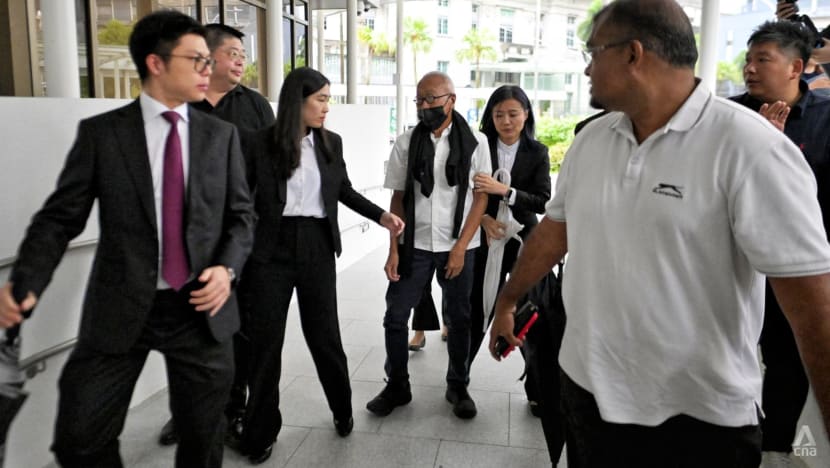
Ong Beng Seng (centre) arrives at the State Courts on Aug 4, 2025. (Photo: CNA/Wallace Woon)

This audio is generated by an AI tool.
SINGAPORE: Property tycoon Ong Beng Seng pleaded guilty on Monday (Aug 4) to abetting former Transport Minister S Iswaran in obstructing the course of justice.
The 79-year-old Malaysian admitted to one charge of arranging to bill Mr Iswaran belatedly for a sum of S$5,700 (US$4,480) to Singapore GP for a business class flight ticket from Doha to Singapore.
This payment was made months after the flight itself and only after the Corrupt Practices Investigation Bureau (CPIB) discovered Mr Iswaran's name on the manifest for his outbound flight to Doha when investigating a separate case.
A second charge will be taken into consideration, for Ong instigating Mr Iswaran to obtain flights and a hotel stay from him. This was when Mr Iswaran knew Ong had business dealings linked with Mr Iswaran's official functions.
The hearing focused mainly on Ong's multiple medical conditions and what that meant in terms of the sentence that should be imposed.
Ong suffers from advanced multiple myeloma, an incurable cancer that attacks plasma cells. The cancer has also damaged his skeletal system and severely compromised his immune system, making him vulnerable to life-threatening infections.
He also has other medical complications that exacerbate his risk of infection and place him at risk of gangrene. His lawyers said his current prognosis was only achieved because his conditions have been closely managed by a team of doctors and nurses for the past four to five years, and going to jail would reverse the progress.
The prosecution, led by Deputy Chief Prosecutor Christopher Ong, said they would have asked for eight weeks' jail for Ong, explaining in detail how they calculated that figure based on the jail term Mr Iswaran had received.
However, due to the "severity and complexity" of Ong's incurable medical conditions, imprisonment would result in "an increased risk of endangering his life".
Therefore, the prosecution did not object to judicial mercy being exercised in this case, and for the maximum fine being imposed instead.
Ong's defence team, led by Senior Counsel Cavinder Bull from Drew & Napier, explained his medical conditions, stressing that prison would expose Ong to potential infections that could kill him.
In contrast, he has had a medical team of doctors and nurses treating him for several years, who are familiar with his conditions. His home environment is also "more pristine" than prison, where more people come and go with guard changes and staff changes in the prison hospital.
Judicial mercy refers to the discretionary power that Singapore's courts have to impose a sentence that is more lenient than what the circumstances of an offence would otherwise warrant.
This is in recognition of exceptional mitigating circumstances.
Courts have previously exercised judicial mercy in cases involving dire medical conditions, such as where the offender did not have long left to live, or where jail would pose a significant risk to the offender's life.
Principal District Judge Lee Lit Cheng reserved her sentence, which will be given on Aug 15.
However, before doing so, she questioned Mr Bull about two overseas trips Ong had made after he was charged. She asked how Ong's ability to travel "aligns" with the severity of his medical conditions, since overseas travel entails "increased exposure to infections" and "greater risks of falls and injuries" especially in unfamiliar environments, as highlighted by the defence in their arguments against putting Ong in jail.
To this, Mr Bull agreed that overseas travel does normally increase one's exposure to infection, but Ong had the benefit of being able to travel by his own private jet, with a medical team and cabin crew who are familiar with his medical regimen.
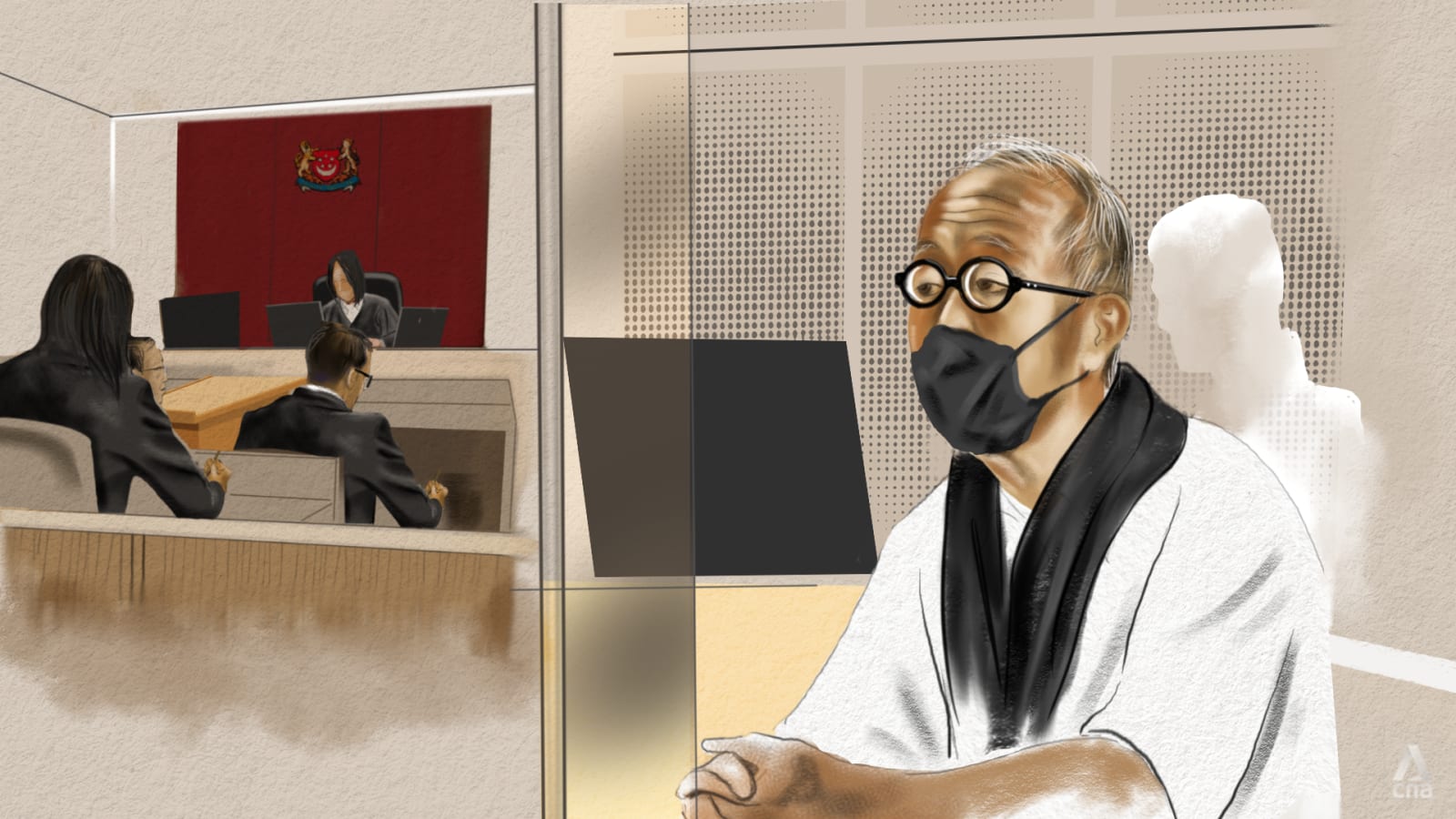
WHAT ONG PLEADED GUILTY TO
The court heard that Ong was the majority shareholder of Singapore GP at the time of the offences and remains so.
At the time, Mr Iswaran was Minister-in-charge of Trade Relations and responsible for overseeing the Formula 1 Singapore Grand Prix as a national project.
Singapore GP was responsible for organising and promoting the Singapore Grand Prix every year from 2008 to 2023, except for 2020 and 2021, during the COVID-19 pandemic.
From 2012 to 2022, the Singapore Tourism Board and Singapore GP entered into three contracts for the promotion, hosting and staging of the race.
Mr Iswaran was also the chairman of the F1 Steering Committee, which was set up in 2007 to oversee the race as a national project.
The court heard that sometime on or before Dec 6, 2022, Ong asked Mr Iswaran if he would like to join him on a trip to Qatar.
Ong informed Mr Iswaran that he would be travelling to Qatar on his private jet, that Mr Iswaran would be going as his guest, and that Ong would look after him.
By this, Ong meant that he would take care of all the expenses for the trip, including Mr Iswaran's hotel accommodation, said prosecutors.
Mr Iswaran accepted the invitation but said he would need to arrive back in Singapore by Dec 11, 2022. Ong responded that he would arrange for Mr Iswaran to travel back to Singapore on a commercial flight.
Mr Iswaran accepted Ong's offer and applied for urgent personal leave to go on the trip.
On Dec 10, 2022, Mr Iswaran travelled to Doha, the capital of Qatar, in Ong's private jet. This flight had a value of about US$7,700.
Mr Iswaran checked into the Four Seasons Hotel in Doha for one night, which cost S$4,737.63. The next day, he flew back to Singapore on a business class ticket that cost S$5,700.
Singapore GP paid for the hotel stay and return flight to Singapore. Mr Iswaran only made payment to Singapore GP for the return flight on or about May 25, 2023.
DISCOVERY OF THE OFFENCE
On or about May 17, 2023, CPIB was investigating a separate matter related to Ong's associates when it came across the flight manifest of the flight on Ong's private jet that Mr Iswaran had taken to Doha.
On May 18, 2023, Ong was informed by his associates that CPIB had seized the flight manifest containing details of the Doha trip, and that CPIB had questioned them about the Doha trip.
Sometime between May 18 and May 23, 2023, Ong spoke to Mr Iswaran on the phone and informed him that the flight manifest for the Doha trip had been seized by CPIB when it was investigating a separate matter. Mr Iswaran acknowledged this.
The next day, they spoke on the phone again. Mr Iswaran asked Ong to have Singapore GP bill him for the expenses related to the Doha trip, including his return flight.
Ong agreed and asked a director of Singapore GP to arrange this. Ong also instructed this director to keep proper records of the payment by Mr Iswaran.
On May 24, 2023, the director emailed Mr Iswaran's personal assistant an invoice for the flight from Doha to Singapore. Mr Iswaran issued a cheque for S$5,700 to Singapore GP.
"Iswaran's act of making payment for the said flight ticket had a tendency to obstruct the course of justice, as it made it less likely that he would be investigated by CPIB in relation to the Doha trip," said the prosecutors.
Ong was aware of this, they added.
PROSECUTION ARGUMENTS
The prosecution accepted that there is a basis for the court to exercise judicial mercy given Ong's medical conditions, "and, in particular, his serious and relatively rare condition of multiple myeloma".
If not for this, eight weeks' jail would have been appropriate for Ong, said Deputy Chief Prosecutor Christopher Ong. The senior counsel sought instead the maximum fine.
There is no maximum fine specified in Ong's charge sheet for the offence of abetting obstruction of justice, but the State Courts can impose a fine of up to S$30,000 (US$23,315).
The prosecutor cited the serious nature of the investigations obstructed, saying Ong knew that the payment made it less likely that Mr Iswaran would be investigated for the Doha trip.
The trip, valued at almost S$21,000, was a gift from Ong to a sitting minister, with whom Ong had official dealings, said the prosecutor.
He added that Ong himself was implicated in the Doha trip and in CPIB's potential investigations. While Mr Iswaran was the primary offender in the accepting of the valuable gift, Ong was the giver and liable to be investigated.
However, the prosecution recognised that Ong's culpability was significantly lower relative to Mr Iswaran, as the latter was the sitting minister and had asked to make a belated payment for the business-class flight.
The prosecutors asked the court not to accept or place weight on an assertion by an expert cited by the defence, stating that "typical prison conditions, characterised by overcrowding, poor sanitation and limited access to medical care, would exacerbate (the accused's) already fragile condition".
This is because the expert, Professor Paul G Richardson, is based in the United States, and has not claimed any familiarity with the Singapore prison system, nor do his remarks accurately describe Singapore's prison environment, said the prosecutors.
INFECTIONS CAN KILL HIM: DEFENCE
Mr Bull, who led the defence team, urged the court to impose a "stiff fine" on Ong, without specifying a figure.
He stressed that any infections could kill his client, saying his is "a particularly extreme case" of this disease, with a world expert on the subject describing it as "one of the most complex and high-risk cases".
"This is a disease that kills. There is no cure," said Mr Bull of his client's multiple myeloma. He said if something happens in prison, the doctor attending to Ong would not be a specialist in multiple myeloma nor familiar with his medical history.
"The doctor who sees him might not even be the same doctor who saw him before," said Mr Bull. "Prisons will have to refer him to public hospitals to be reviewed before he can be treated. This is quite unlike his present situation where his specialist doctors have immediate access to Mr Ong."
Because the risk of infection increases in prison for Ong, the risk of death also goes up, said the lawyer. He said Ong is living "within a very narrow margin where there is no room for error".
The multiple conditions Ong has "are a devastating cocktail of medical problems". Since Ong is immunocompromised, he could die from complications, and his skeleton is so compromised that he could die from a fall, he said.
He argued against the prosecution's indication of eight weeks' jail as a starting point for Ong, which is based on Mr Iswaran's jail term.
"There's no dispute that there was no persistence, premeditation or sophistication to Mr Ong's conduct. This was in contrast to Mr Iswaran," said Mr Bull.
Citing the prosecution's submissions, he said Mr Iswaran's actions had stemmed from his "personal perceived interest". He was the acting minister and he had acted with deliberation and premeditation.
These are absent from Ong's case, said Mr Bull, submitting that the starting point for his client "must be radically lower".
He said Mr Iswaran was the "prime mover" who had put the plan in motion, initiated things and asked Ong to issue an invoice.
Ong's involvement, on the other hand, was "much less significant". He had received a request from the minister to issue an invoice and "he merely complied", by telling Mr Mok Chee Liang from Singapore GP to arrange the billing for Mr Iswaran.
"So there was no deliberation or premeditation on Mr Ong's part, he merely complied with the minister. His role was momentary. He was asked to bill Mr Iswaran, and so he told Mr Mok to arrange it for him. That's it. That's all Mr Ong did," he said.
He added that it was Ong who instructed Mr Mok to keep proper records, and that the documents showed "exactly what happened" - that payment was made only after CPIB came on the scene.
Mr Bull argued that after factoring in Ong's early plea of guilt, he should get "zero days' jail".
"Your Honour, don't send him to jail," he said. "His culpability is low; no harm done. Sending him to jail would risk endangering his life. It would be entirely disproportionate."
The court had heard that there was no adverse effect on CPIB's investigations, a point accepted by the High Court in Mr Iswaran's case.
Mr Bull also raised other potential mitigating factors such as Ong's age, as the court generally shows compassion to offenders above 60 with a clean record.
He cited Ong's contributions to Singapore, collaborating with groups and agencies to bring F1 to the country and for students to work on the race to gain experience in managing large-scale events.
He also cited how Ong promoted concerts and cultural events that helped to transform Singapore into a regional hub, with acts like Eric Clapton, One Direction and Coldplay.
Ong also worked to help supply masks and ventilators to other countries during the COVID-19 pandemic and donated money to help the Criminal Legal Aid Scheme, said the lawyer.
In conclusion, he said Ong's "momentary mistake to give a singular instruction to Mr Mok for payment was wrong", but said this was "a unique blemish on an otherwise clean record".
MONDAY'S MISHAPS
Ong had arrived at the State Courts on Monday morning, flanked by his team of lawyers, hoisting an umbrella to fend off the rain.
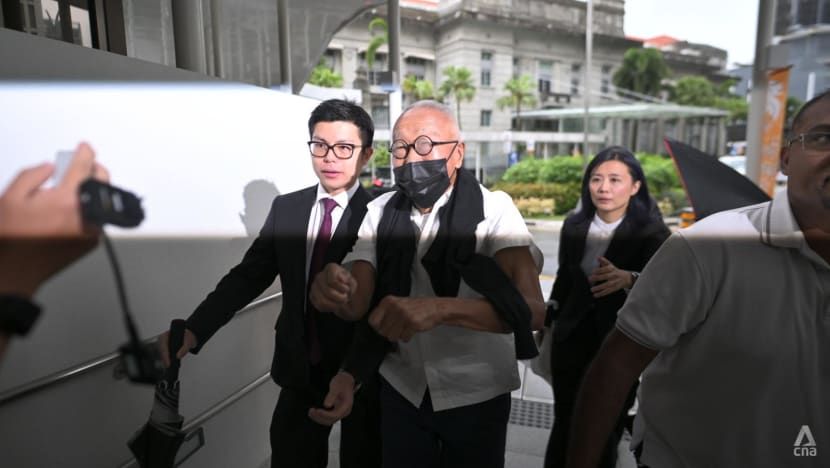
His guilty plea came after several pre-trial conferences and an adjournment for a previous plea date set for July. On Monday, the taking of the plea seemed uncertain when two fire alarms went off after the judge appeared.
The alarms were later determined to be false, and the hearing proceeded 45 minutes late with an almost-full public gallery filled with lawyers, media and members of the public.
The plea also comes about two months after Mr Iswaran was released on remission for his 12-month jail sentence, following his completion of home detention.
The businessman was first charged with two offences in October 2024 that correspond to two of the charges Mr Iswaran pleaded guilty to.
Mr Iswaran was given four months' jail in October for the corresponding obstructing justice charge. His total sentence was 12 months for a total of five charges, with another 30 charges taken into consideration.
The Attorney-General's Chambers (AGC) said in a statement after Mr Iswaran was sentenced in October that the prosecution would not be tendering charges against Ong for his involvement in other charges faced by Mr Iswaran.
"In arriving at this decision, the prosecution considered all the relevant facts and circumstances of the case, including the role that Ong played in each of the transactions," said the AGC at the time.
It later emerged that Ong was undergoing treatment for cancer.
The bent-over man closed his eyes at multiple points in the dock while waiting for the hearing to begin.
His family was not present. His PR firm said in a statement to CNA that the businessman's family had stood by him "throughout this ordeal" and Ong did not wish to "prolong the toll it has taken on them by having them present in court today".
Ong left the State Courts the same way he came – without responding to any questions from the media.
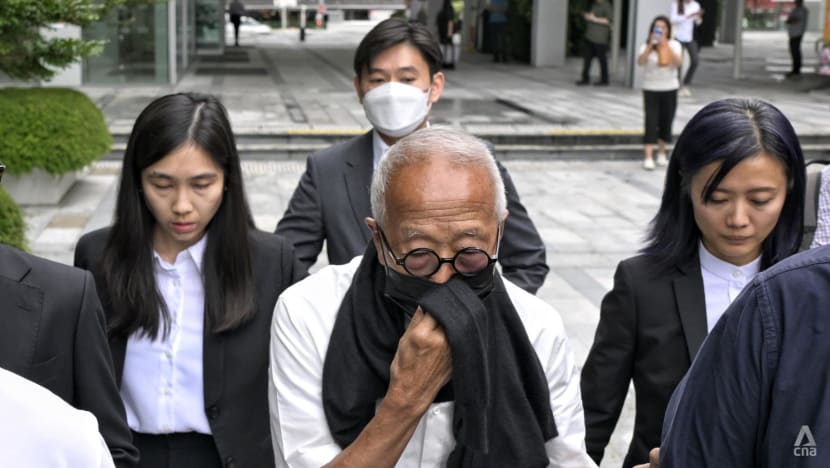
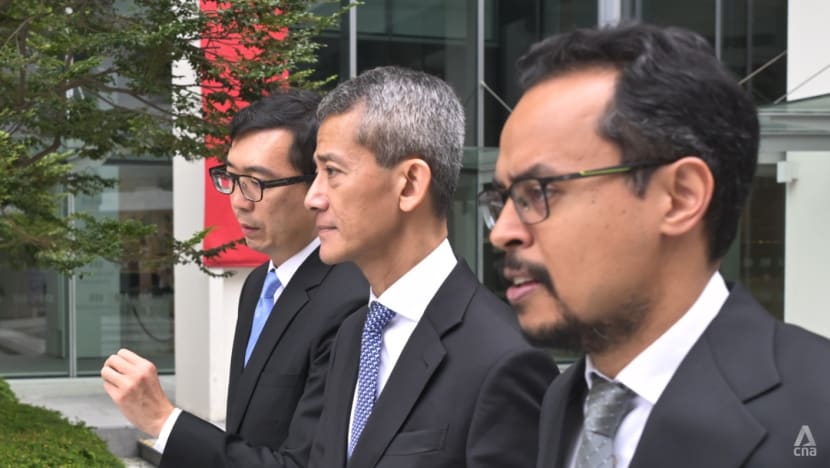
His bail, which remains at S$800,000, has been extended until his sentencing.
The maximum jail term for abetting the obstruction of justice is seven years.





















